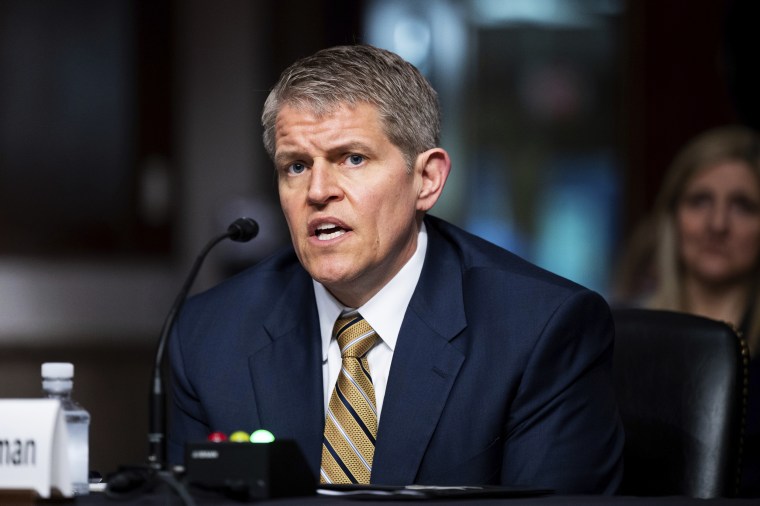Since the ATF director position became a Senate-confirmed job 15 years ago, the Senate has confirmed a grand total of one person to the post. Evidently, that number will not grow anytime soon. The Washington Post reported today that the White House is pulling the plug on David Chipman's nomination to run the Bureau of Alcohol, Tobacco, Firearms and Explosives.
President Biden nominated Chipman, who worked at ATF for more than two decades before joining the gun control group led by former congresswoman Gabrielle Giffords (D-Ariz.), in April as part of a larger effort to curb gun violence. But his nomination faced unified opposition from Republican senators as well as concerns from a handful of Senate Democrats from states friendly to gun rights.
It's worth emphasizing that there hasn't yet been an official announcement from the White House, and MSNBC and NBC News have not yet independently confirmed the Post's reporting.
That said, the writing has been on the wall, and no one involved in the process will be surprised by the apparent developments.
Let's circle back to our earlier coverage to review how we arrived at this point.
When President Joe Biden nominated David Chipman to lead the ATF five months ago, there was reason for optimism: Chipman served as an ATF special agent for 25 years; he's a respected policy expert; and he's a veteran of the Justice Department. Chipman also recently worked as a senior policy adviser at Giffords — an organization founded by former Democratic Rep. Gabby Giffords of Arizona and committed to reforming the nation's gun laws. He seemed like a fairly obvious choice.
Republicans, however, didn't quite see it that way. In June, Republican Sen. Susan Collins of Maine announced her opposition to Chipman, describing him as "divisive." A few weeks later, Republican Rep. Andy Biggs, the chair of the far-right House Freedom Caucus, said in reference to the ATF nominee, "The first thing you've got to do is stop the guy that's going to enforce the laws — and that's Mr. Chipman."
When it came time for the Senate Judiciary Committee to advance the nomination, the panel deadlocked: Zero GOP senators were willing to support Chipman.
In theory, the Democratic majority didn't need any Republican votes to confirm the ATF nominee, but a handful of members from the Senate Democratic conference — including West Virginia's Joe Manchin, Montana's Jon Tester, and Maine's Angus King – were reportedly skittish in response to the right's pushback.
And so, it appears the ATF will once again have to proceed without a Senate-confirmed leader. If the reporting is correct, Chipman will be the first major Biden nominee to fail since Manchin derailed Neera Tanden's nomination to lead the White House Office of Management and Budget.
As for the agency Chipman was supposed to lead, B. Todd Jones, a former federal prosecutor tapped for the job by then-President Barack Obama, remains the only Senate-confirmed ATF director — and he just barely passed Senate muster in 2015.
Senate Republicans didn't even confirm Donald Trump's nominee to lead ATF — and GOP senators generally saw themselves as little more than rubber stamps for whatever Trump wanted.
The trouble, of course, is that Republicans feared Trump's nominee might strictly enforce the nation's gun laws, and the party wasn't prepared to let that happen. Indeed, one of the central reasons the ATF exists is to address gun trafficking and gun crimes, which has led GOP senators for a decade and a half to oppose practically every nominee to lead the agency.
As of today, the streak continues.
Update: NBC News has now confirmed The Post's reporting.
